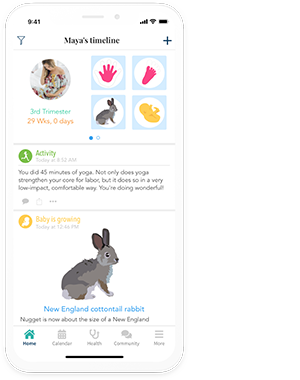- Patients Patients
Reproductive Genetics Testing
Patient Resources
Cost & Billing
- Providers Providers
- Genetic Counseling
- Login Login
- Estimate My Cost

Testing and continuity of care for preconception, pregnancy and pediatric care
Pregnancy
Pregnancy is a dynamic time. Whether you’re looking for carrier screening, routine tests or more advanced diagnostic testing, Labcorp is one of the few laboratories that can deliver pregnancy insights while providing a true continuity of care and support throughout the entire pregnancy period and beyond.
It’s a fact—getting early and regular prenatal care improves the chances of a healthy pregnancy.
Laboratory testing is a crucial part of your prenatal care and helps your doctor make sure you and your baby are well at this important time.
Carrier Screening
Carrier screening can help determine if you and your partner are at an increased risk of having a baby with a specific inherited disorder, such as cystic fibrosis or spinal muscular atrophy. Early insight can help you better prepare for the future.
Labcorp offers choice in carrier screening, from a comprehensive screen for more than 500 disorders to screening for specific disorders. Your doctor can help you determine which test is right for you.
When should I get screened?
Carrier screening can be performed at any time but is most useful if it is performed before pregnancy or as early as possible during pregnancy.


Early Pregnancy Health Screening
Routine and regular lab tests are suggested for all women as part of routine prenatal care. These tests can help confirm that you are healthy, as well as provide vital information to help you manage and decrease any risks that your health may pose to your newborn baby. Talk to your doctor about what tests are right for you.
When should I get testing?
- Routine obstetric profiles are suggested in both the first and second trimesters
- Gestational diabetes screening is recommended at 24-28 weeks1
- STI screenings are recommended in the third trimester
Prenatal cfDNA (NIPT) Screening
By detecting small amounts of DNA from the placenta in your bloodstream, a noninvasive prenatal test (NIPS/NIPT) can help identify if there is an increased chance for certain chromosome abnormalities that can affect your baby’s health and development. It can also indicate if you are more likely to have a boy, girl or both.
Most NIPSs (NIPTs) screen for certain chromosomal abnormalities called trisomies. These include trisomy 21 (Down syndrome), trisomy 18 (Edwards syndrome) and trisomy 13 (Patau syndrome).
When should I get screening?
NIPS (NIPT) can be performed in any of the trimesters during pregnancy but is typically not performed until after nine weeks to ensure there are enough fetal cells to screen.


Prenatal Serum Screening
Prenatal or maternal serum screening tests are another noninvasive option for determining the chance your baby may have a chromosome abnormality that may affect their development. These screening assays can help to detect Down syndrome, trisomy 18 or open neural tube defects, depending on the particular test your doctor uses and how far along you are in your pregnancy.
Similar to NIPS (NIPT), a positive serum screen can be confirmed with a diagnostic test. Your doctor can help determine which tests are right for you.
When should I get screening?
Prenatal or maternal serum screening is typically performed in the first and second trimesters, and they may be done with sequential blood samples—one collected in the first trimester and another collected in the second trimester.
Prenatal & Pediatric Diagnostic
Diagnostic procedures, such as amniocentesis and chorionic villus sampling (CVS), are used to perform tests for chromosomal abnormalities, open neural tube defects and/or specific inherited diseases in an ongoing pregnancy.
We also offer pediatric diagnostic testing to analyze chromosomes in newborns and infants for changes that can explain certain birth defects or developmental delays.
When would testing be considered?
Prenatal diagnostic testing is not a routine test during pregnancy but can be considered or recommended by your physician when clinically indicated, such as in the case of a positive NIPS (NIPT) or prenatal/maternal serum screening result. CVS specimens are generally collected at nine weeks or later, and amniotic fluid samples are not recommended to be collected before 15 weeks.


Prenatal cfDNA (NIPT) Screening
Preeclampsia is a serious pregnancy complication characterized by high blood pressure and organ damage. Early detection and treatment are key to prevent severe complications for both mother and baby. While most women will have a healthy pregnancy, it's important to be aware of the signs and symptoms of preeclampsia.
When should I get screened?
Labcorp offers a comprehensive approach to preeclampsia screening, covering all stages of pregnancy. Earlier detection allows for closer monitoring and potentially earlier intervention, which can lead to better outcomes.
- First Trimester Test: Using a blood sample drawn between weeks 11.0 and 14.0 of your pregnancy, this test assesses your potential risk for developing preeclampsia later in your pregnancy (before 34 weeks)
- Second and Third Trimester Test: Using a blood sample drawn between 23 and 34.9 weeks gestation, this test assesses the risk of a hospitalized patient's preeclampsia progressing severely within the following two weeks
For a detailed guide of testing through your trimesters, please visit Testing While Expecting
Reference:
- US Preventive Services Task Force. Screening for Gestational Diabetes: US Preventive Services Task Force recommendation statement. JAMA. 2021;326(6):531-538. DOI:10.1001/jama.2021.11922.






